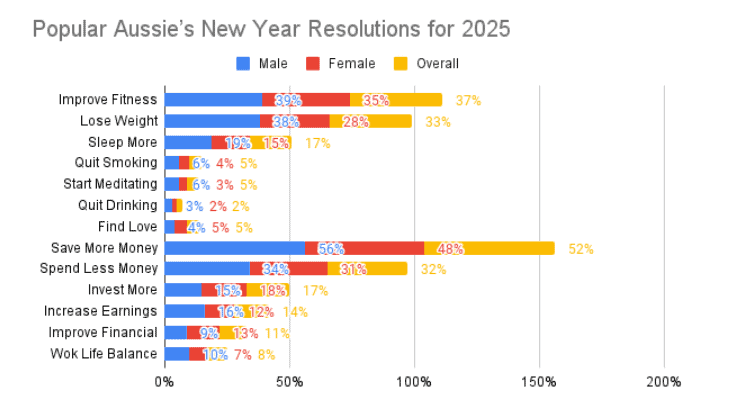As the clock strikes midnight on December 31st, millions of Australians set their sights on a fresh start, crafting their New Year Resolutions to make 2025 a year of transformation. These resolutions, symbolic of hope and renewal, span across various facets of life, from health and wealth to love and personal growth. For many, the dawn of a new year is a time to reflect on past successes and shortcomings while setting intentions for the future. It’s a moment of optimism, where people resolve to take control of their lives and make meaningful changes.

These goals reflect diverse aspirations, from better health and financial stability to finding love and personal growth. But what drives people to set these goals year after year? And why do so many struggle to stick to them? This article explores the motivations, trends, and challenges behind Australia’s common new year resolution for the coming year, based on recent data.

The Top Contenders for 2025
Health Takes Center Stage
Leading the charge in health-related New Year Resolutions are commitments to eat healthy (39%), improve fitness (37%), and lose weight (33%). These goals underscore a growing awareness of the importance of maintaining a healthy lifestyle. While resolutions to sleep more (17%) and start meditating (5%) reflect a focus on mental well-being, smaller groups aim to tackle harmful habits, with 5% resolving to quit smoking and 2% to quit drinking.
The emphasis on health highlights a universal desire to feel better, look better, and live longer. Interestingly enough, women are more inclined towards leading a healthier lifestyle as compared to men which indicates the added pressure that women might feel to look good. As one Brisbane resident shared, “This year, it’s all about balance. I’m focusing on healthy eating and regular exercise instead of crash diets.” Such sentiments reflect a shift toward sustainable health practices rather than short-lived fixes.
Wealth: The Most Popular Category
When it comes to financial aspirations, a whopping 52% of Australians resolved to save more money, making it the single most common new year goals. With economic uncertainty and rising costs of living, it’s no surprise that financial security is at the top of people’s minds.
Other financial goals include spending less money (32%), investing more (17%), and improving financial literacy (11%). Meanwhile, 14% of respondents aim to increase their earnings, indicating a proactive approach to career advancement and entrepreneurship. What is astonishing is that men seem to be more comfortable with their current financial situation as compared to women in Australia since the data indicated that the drive to earn and save money is more prominent amongst women.
Financial resolutions often stem from a desire for long-term security and the freedom to enjoy life without constant financial stress. As Sophie, a Sydney-based graphic designer, put it, “Saving more and learning about investments are my key goals. I want to build a safety net and maybe even buy a house in a few years.”
Love and Personal Growth
Although health and wealth dominate and love is not one of the most popular resolutions, resolutions about love and relationships still hold significance. Around 5% of Australians aim to find love in 2025, while others focus on personal growth through activities like meditation or spending more time with loved ones. It’s also a common belief amongst people that it’s easier for women to find a partner and the data indeed agrees. More Aussie men have made the resolution to fin love this year as compared to women. These goals, while less common, reflect a yearning for connection and emotional fulfilment.
Why New Year’s Resolutions Fail

Despite the enthusiasm surrounding new year resolutions 2025, many fail to stick to their goals. Studies suggest that up to 80% of resolutions are abandoned by February. But why?
- Lack of Specificity: Broad goals like “get fit” or “be healthier” often lack actionable steps. Without a clear plan, it’s easy to lose focus.
- Unrealistic Expectations: Setting overly ambitious targets, such as losing 10 kilograms in a month, can lead to burnout and discouragement.
- Lack of Support: Pursuing goals in isolation can be challenging. Having a support system—friends, family, or even online communities—can make a significant difference.
- No Progress Tracking: Failing to track progress can make it hard to see improvement, which is a key motivator to continue.
Understanding these pitfalls is crucial for creating resolutions that stick. Setting SMART goals (Specific, Measurable, Achievable, Relevant, Time-bound) can significantly improve the likelihood of success.
Tips for Achieving New Year Goals
- Start Small: Break your New Year goals into manageable steps. For example, instead of resolving to “get fit,” commit to 30 minutes of exercise three times a week. Small, consistent changes add up over time.
- Stay Accountable: Share your goals with someone you trust or join a group with similar aspirations. Accountability partners can provide encouragement and help keep you on track.
- Celebrate Milestones: Acknowledge and reward progress, no matter how small. For instance, if you aim to save more money, celebrate when you reach your first $500 saved. This positive reinforcement can boost morale and determination.
- Adapt and Adjust: Life happens. If circumstances change, don’t abandon your resolution entirely; adjust it to suit your new reality. Flexibility can help sustain long-term commitment.
- Visualize Success: Picture the benefits of achieving your goals. Visualization can strengthen your resolve and keep you focused on the bigger picture.
- Track Progress Regularly: Use journals, apps, or charts to monitor your advancement. Regular tracking provides tangible proof of your efforts and keeps your goals top of mind.
- Reconnect with Your Why: Remind yourself of the reasons behind your resolution. Whether it’s to improve health, achieve financial stability, or strengthen relationships, staying connected to your motivations can reignite your passion.
Resolutions Beyond Numbers
While the statistics reveal overarching trends, the real stories behind these resolutions are deeply personal. For some, saving more money is about securing their family’s future; for others, improving fitness might be tied to overcoming a health scare. These nuances highlight that New Year Resolutions are more than just fleeting promises—they’re aspirations rooted in the hope for a better tomorrow.

Looking Forward
As we step into 2025, the mix of common New Year resolutions reflects a society striving for balance between physical health, financial stability, and emotional well-being. Whether it’s eating healthier, saving money, or finding love, Australians’ goals mirror universal human desires for happiness and fulfilment.
While the journey to achieving these goals may be fraught with challenges, the act of setting them is a testament to our resilience and optimism. By addressing the reasons why New Year’s resolutions fail and adopting strategies for success, 2025 could be the year that dreams turn into reality. So, what are your New Year resolutions? Will you focus on health, wealth, or love? Perhaps, with the right mindset and strategies, it’s possible to have it all.
